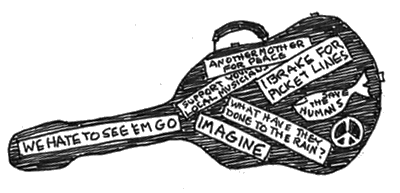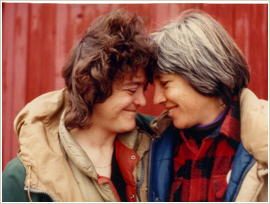


I
long ago told my partner, Claudia, that one of the reasons I was
attracted to her was her vocabulary. Now and then, when one of us turns a
particularly felicitous phrase, we will look at each other and say
“vocabulary.” It’s certainly one of the many things that made working
with storyteller Gay Ducey
such a joy. No one else I know speaks of an absolute as being “of the
purest ray serene”...but my father did. My mother was thirty-five and my
father forty-two when I was born, so their speech was definitely of an
older generation. Gay is younger than I am, but she was born and raised
in the South, where some colorful old expressions survive--or maybe it’s
just that I notice them, a Yankee born and bred.
My
father was born in Bay City, Michigan, and grew up on farms and in Bay
City and Detroit. His speech was Midwestern and earthy. When describing
something done any-which-way, he’d say, “By main strength and
awkwardness,” or sometimes he’d use the whole phrase as he had heard it,
“They did it like the bear shit the corn, by main strength and
awkwardness.” Some of his colorful speech I believe he made up on the
spot, liked, and re-used, such as “If you’re weaned on shit, you’ll
swear by it.”
My
mother’s parents spoke Yiddish with their friends, but Mom didn’t
retain much of it. Still, Yiddish or Yinglish expressions came into her
conversation, and when her mother came to live with us when I was in the
fifth grade, I also heard them directly. I remember my grandmother
saying, “Bin ich den ah garbage can?” when I asked her to finish
something I didn’t like to eat. The original, she explained, was what
someone had said when spat upon: “Bin ich den ah shpittoon?” My
mother was born and grew up in San Francisco, and though her accent was
standard California, she said that she slid into the “South of the Slot”
accent of old San Francisco when she was nervous or in Brooklyn where
the speech is similar.
My
mother studied Anglo-Saxon, Middle English, and medieval French on her
way to getting a Ph. D. in Romance Philology. She read me Babar books in
French when I was little and sang French folk songs to me. Later she
delighted me by reading Chaucer and other Middle English verse aloud so I
could hear how it sounded.
When
I was writing essays for school and asked her about a word, she would
say, “Go look it up.” The trouble was, I would find so many interesting
words on the way to the one I wanted that I would have a hard time
getting the writing done. Looking words up in an internet dictionary
eliminates this problem, but I would have missed ‘theorbo’ (a musical
instrument) if we’d had the internet when I was in high school. Granted,
I haven’t had a use for the word until now, but I’ve had it handy, just
in case, for about fifty years.
Malvina
was addicted to crossword puzzles and anacrostics. For a long time, I
could take them or leave them, but a few years ago, I got addicted too. I
quit buying puzzle books when I was eliminating activities to make time
to write the biography, but I’m still allowing myself the Sunday NY
Times puzzle.
This
just in: The same day I wrote all that, I got an invitation to join the
crew of Word-A-Day, a mixed bag of word freaks who take an odd word
each day and write a limerick using it. I consider this invitation quite
an honor. So I clear one thing (puzzles) out of my life and add
another. The limerick usually doesn’t take as much time as a puzzle, and
I can skip the words I don’t get an immediate idea for. Here is one of
the words and my limerick:
Prise (pryz) verb tr
1. To force open or part something with a lever
2. To extract information from someone with difficulty
noun
A lever
A lady with muscles of size
Found a knight who did light up her eyes.
He was stuck in his armor,
Which made her the warmer,
She would this handsome sir prise.
© 2007 by Nancy Schimmel

Tuesday, January 2, 2007


VOCABULARY






